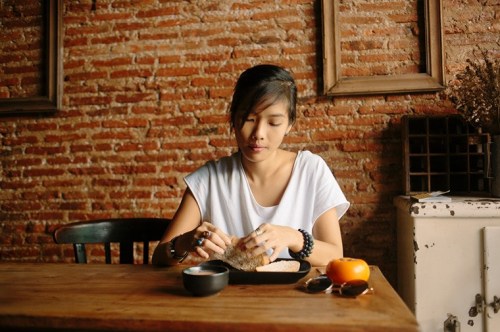Our editors independently select these products. Making a purchase through our links may earn Well+Good a commission
Can the food you eat affect your mental health?
Dr. Drew Ramsey says your diet is a powerful tool for beating depression—and that's exactly why he launched a new e-course full of nutrition tips.

You’ve probably heard the phrase “you are what you eat”—but have you considered that the maxim may specifically apply to your mental health? According to Well+Good Council member Drew Ramsey, MD, what’s on your plate has more power over your mental and emotional state than you may realize.
Earlier this year, a buzzy study found that a healthy diet could serve as an effective treatment for depression—but that was hardly news to Dr. Ramsey, a psychiatrist who has been passionate about the mind-gut connection for years. He’s so passionate, in fact, that instead of writing prescriptions that only your pharmacist can fill, he might hand you one for kale (he didco-author a cookbook with the leafy green as the star ingredient, after all). Research has shown the carotenoids in the vegetable can keep both your gut bacteria and your outlook on life happy.
“Depression is the most disabling medical condition in the world. While there are many evidence-based solutions, treatment often overlooks a critical factor: what people eat.” —Drew Ramsey, MD
Dr. Ramsey’s new self-guided e-course, Eat to Beat Depression, aims to spread knowledge about the connection between diet and depression. “It’s the most disabling medical condition in the world. And while there are many evidence-based solutions, treatment often overlooks a critical factor: what people eat,” Dr. Ramsey says. “I created this course based on the most recent science that connects food choice and mood, information that anyone struggling with depression should have.”
The diet-hacking techniques Dr. Ramsey teaches abound, from what to eat and which core nutrients are necessary in a diet to how to incorporate those foods into an IRL routine. For instance, you should be building a mood-boosting rainbow palette on your plate, as incorporating a variety of colors into your weekly meals can help fight depression. Also, making simple swaps—like eating oven-baked sweet potato fries instead of French fries, or kombucha instead of soda—can help you bid the disorder adieu.
“We can rapidly change what we eat. It’s one of our most powerful tools,” Dr. Ramsey says. Sounds like some great advice to implement in time for the holiday season, right?
Are “depression naps” actually a good idea? Also, science says you should exercise this much to prevent depression.
Sign Up for Our Daily Newsletter
Get all the latest in wellness, trends, food, fitness, beauty, and more delivered right to your inbox.
Got it, you've been added to our email list.










